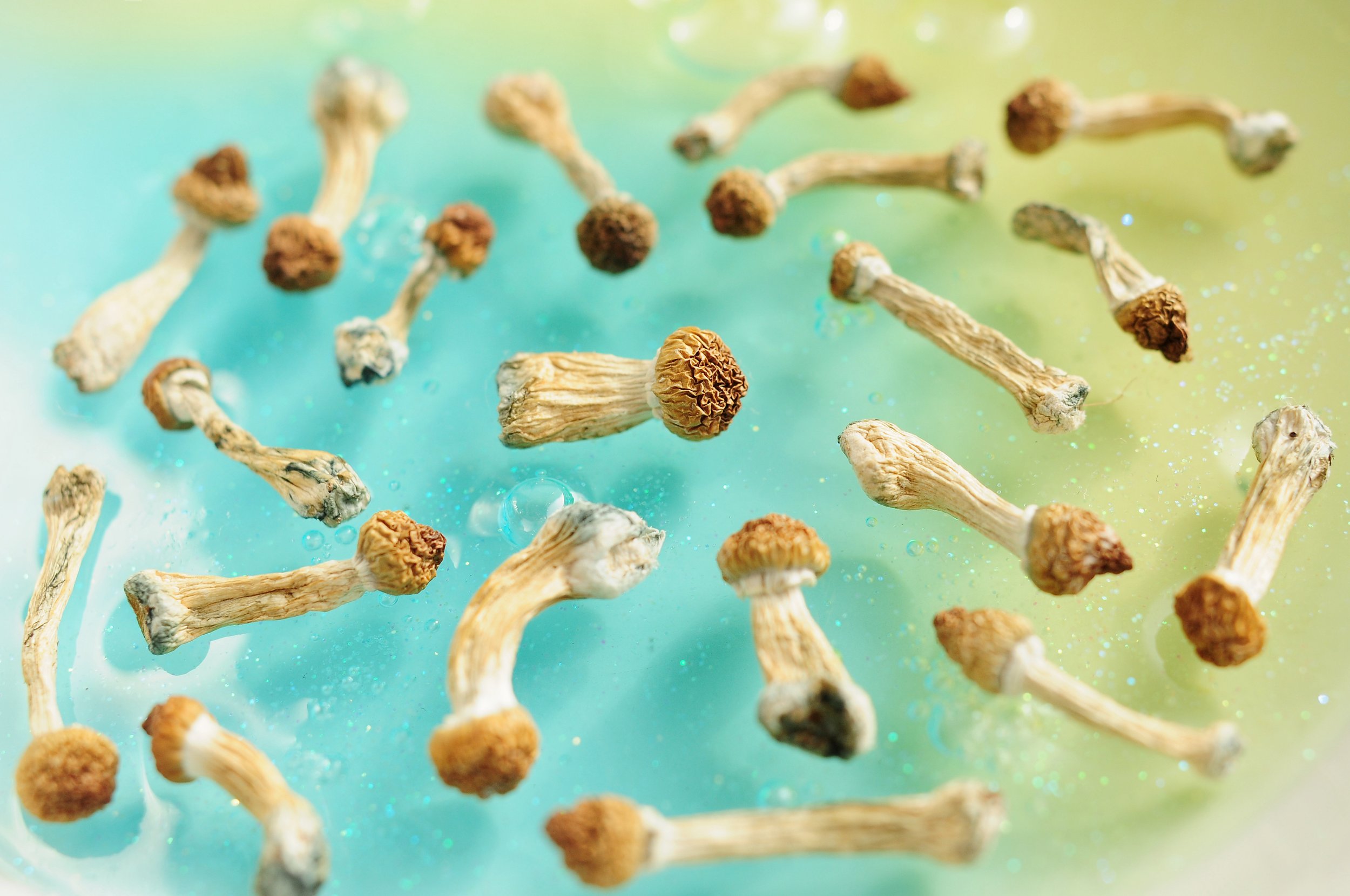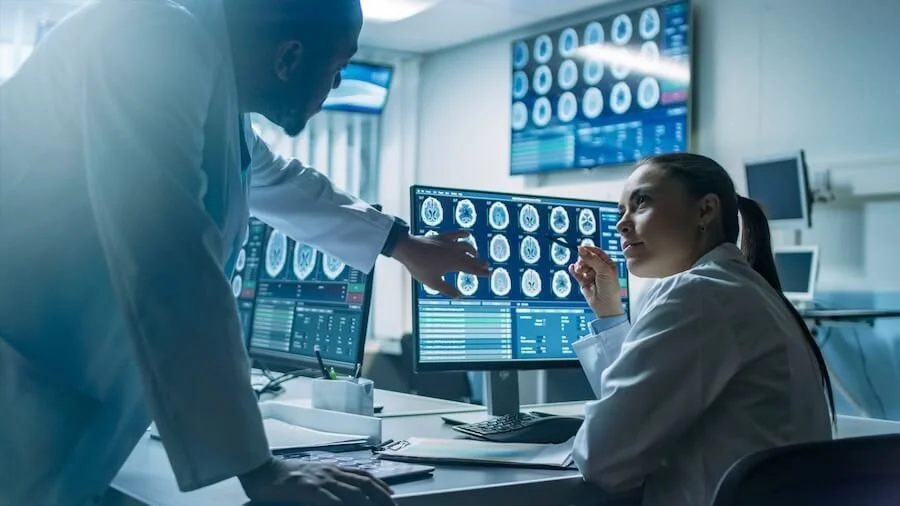Psilocybin Benefits: What Science & Experience Reveal
Psychedelic research is unlocking new therapeutic possibilities, and psilocybin is at the forefront of this incredible paradigm shift.
Often called magic mushrooms, this naturally occurring compound is found in certain fungi. Psilocybin’s benefits in mental health, wellness, and personal transformation are being studied at research centers across the United States and Europe with promising results. Scientific data and anecdotal real-world experiences suggest that these benefits extend far beyond psilocybin’s mind-altering effects.
As an Oregon-Licensed Psilocybin Facilitator in Bend, Oregon, I’ve guided many clients through legal, professionally facilitated psilocybin experiences and witnessed the profound shifts that often occur. My approach is shaped by current research, years of facilitation, and my own journey with psychedelics. In this article, I review the key benefits of magic mushrooms and explain why preparation, facilitation, and integration with an experienced professional are essential for safe, meaningful, and lasting results.
Disclaimer: This information is for educational purposes only and is not medical advice. These substances are not appropriate for everyone. Always consult a qualified professional before making decisions about psychedelic use.
Breakthrough Therapy: Psilocybin for Depression
The U.S. Food and Drug Administration (FDA) has designated psilocybin as a Breakthrough Therapy for major depressive disorder (MDD) and treatment-resistant depression (TRD). This status is based on compelling evidence from clinical trials led by respected institutions such as Johns Hopkins, NYU Langone, and Imperial College London. Recent studies suggest that psilocybin may produce rapid and significant reductions in depressive symptoms, with many participants achieving remission after only a few sessions.
Researchers believe this may be due to psilocybin’s effects on how the brain processes emotions, helping people move past negative thought patterns and support deeper healing. Based, in part, on these promising results in depression, research on psilocybin’s potential benefits is underway in over a dozen other mental and neurological conditions.
Expanding Research: Psilocybin’s Potential
While psilocybin is not a proven cure and the science is still evolving, studies and clinical trials are underway to examine potential benefits for a wide range of physical, emotional, spiritual, and mental health concerns, including:
Anxiety disorders including generalized anxiety disorder and anxiety and/or depression in individuals with terminal illness, autism, and Parkinson’s disease
Post-traumatic stress disorder (PTSD)
Obsessive-compulsive disorder (OCD)
Bipolar disorder
Eating disorders, including anorexia
Substance use disorders including opioids, alcohol, cocaine, methamphetamine, cannabis, and tobacco
Cluster headaches and migraines
Chronic pain and fibromyalgia
Neurological conditions such as amyotrophic lateral sclerosis (ALS)
Grief and emotional distress
Creativity and problem-solving
Therapeutic Dosing Context
The psilocybin benefits described here are based on clinical trials which studied a therapeutic dose, most often between 20 and 35 mg of laboratory-tested product which is administered by a trained facilitator during a single session. These doses are significantly higher than “microdoses” and also higher than typical recreational doses.
These research outcomes are reshaping our understanding of mental health, wellness, consciousness, and healing.
How Psilocybin Works in the Brain
When ingested, psilocybin is rapidly converted to psilocin, which interacts primarily with serotonin 5-HT2A receptors — altering perception, mood, and cognition. This interaction creates a cascade of effects throughout the brain that researchers are continuing to study.
Unlocking New Connections
Evidence shows psilocybin disrupts typical neuronal firing patterns and increases “neural cross-talk” — communication between brain regions that don’t usually interact. This expanded connectivity supports fresh perspectives and creative thinking.
Brain imaging studies have helped scientists better understand these effects. Dr. Robin Carhart-Harris, a neuroscientist known for his groundbreaking studies on psychedelics conducted at Imperial College London and the University of California, San Francisco (UCSF), likens it to “shaking a snow globe,” temporarily loosening entrenched thought patterns.
Quieting the Default Mode Network
One of the most notable changes seen in brain imaging during a psilocybin session is the quieting of the default mode network (DMN) — a set of interconnected brain regions active during self-reflection, daydreaming, and rumination. Overactivity in the DMN has been linked to various mental health conditions involving rigid thought patterns, overthinking, and self-criticism.
Brain imaging studies led by Robin Carhart-Harris, show that psilocybin can significantly reduce activity in this network. By temporarily quieting the DMN, this psychedelic medicine may help interrupt repetitive mental loops, allowing for greater mental flexibility, reduced self-focus, and a deeper sense of connection beyond the self.
Many describe this shift as “ego dissolution,” a temporary softening of the boundaries between self and others, which supports emotional, behavioral, and spiritual breakthroughs. It can feel a bit like taking off a pair of tight, distorted glasses. Suddenly the mental lens feels clearer, lighter, and more open.
Shifting Patterns & Enhancing Neuroplasticity
One of the most studied effects of psilocybin is neuroplasticity, the brain’s ability to form new and healthier connections. Studies, including those led by neuropsychopharmacologist Dr. David Nutt at Imperial College London, suggest that psilocybin may:
Reduce rigid, negative thought cycles linked to anxiety, depression, and obsessive-compulsive disorder (OCD)
Support the release of entrenched habits, such as substance abuse or compulsive behaviors
Encourage lasting positive habits and perspectives
During this period of increased brain flexibility, many participants report greater creativity, emotional resilience, and motivation. These changes can help reinforce long-term personal growth well beyond the journey session.
Mystical Experience & Spiritual Insight
Clinical findings, including landmark studies conducted by the late Dr. Roland Griffiths at Johns Hopkins University, suggest that the intensity of mystical-type experiences experienced during a magic mushroom session correlates to greater long-term improvements in anxiety, addiction, and depression. Griffiths’ work found that participants who rated their psilocybin session among the most meaningful events of their lives were more likely to sustain positive changes in mood, behavior, and overall well-being months later. These journeys may include:
A profound sense of unity and connection
Transcendent insights about self, life, or the world
Emotional breakthroughs and deep healing
Some clinical trial participants have described this as reconnecting with an inner healing intelligence or “higher self.” Thought leaders like Deepak Chopra note that much human suffering is a form of spiritual Homesickness, a longing for meaning and belonging. Psilocybin may help address this by cultivating moments of awe, unity, and connection without requiring a religious framework.
Supporting Emotional Processing
Psilocybin may enable individuals to face emotions more directly, like shining a light into hidden corners of the mind. Imaging studies, including those by experimental psychologist Dr. Matthew Johnson at Johns Hopkins University, show increased amygdala activity during the psilocybin experience.
This contrasts with the emotional blunting often seen with some antidepressants and may allow people to engage with, rather than avoid, difficult emotions and unresolved trauma. For some, this deeper emotional processing can lead to meaningful insights and long-lasting psychological benefits.
Psilocybin’s Mechanism of Action Summary
Alters serotonin signaling, especially at 5-HT2A receptors
Increases neural cross-talk and brain flexibility
Quiets the default mode network, reducing rumination
Enhances emotional processing and acceptance
Facilitates mystical and spiritual experiences
Supports long-term shifts in perspective and behavior
Psilocybin & the Mycelial Network: Getting to the Root of Issues
The mycelial network in nature is a vast web of fungal threads that connects and communicates with plants, trees, and soil, sharing resources and information to support the health of the ecosystem. As mycologist Paul Stamets has described, this underground network functions like nature’s internet. It’s no coincidence that magic mushroom journeys can work in a similar way in the human brain, bridging neural pathways and strengthening connections that support mental, emotional, and spiritual well-being.
Unlike treatments that only address surface symptoms, psilocybin-assisted journeys, especially those facilitated by a licensed facilitator, can help explore and address the root of challenges. This deeper work supports personal insight, emotional release, and a greater sense of inner alignment.
Clinical research suggests that guided psilocybin experiences can interrupt cycles of rumination and perfectionism, reduce the need to control, and encourage acceptance and self-compassion.
Participants often describe the following benefits:
Letting go of outdated mental habits and negative self-talk
Living with greater mindfulness and intention
Gaining clarity on how subconscious beliefs or past trauma influence present behavior
This kind of root-level healing is supported by neuroscience findings showing psilocybin’s ability to quiet the brain’s default mode network (DMN), a region linked to overthinking and self-criticism. Reducing DMN activity allows space for healthier perspectives.
Facilitation, Preparation & Integration
The magic in these mushrooms isn’t just in the compound, it’s in the context. Scientific findings increasingly suggest that lasting psilocybin benefits seem to be linked to several key factors:
Skilled facilitators — Guidance from a trained facilitator who can ensure safety, emotional support, and optimal conditions for the participant’s journey
→ What to Look For With a Facilitator
Careful preparation — Screening for potential risks, clarifying intentions, going inward, and building a mindset that supports the participant’s goals
→ How to Prepare For a Magic Mushroom Experience
Supportive integration — Processing insights afterward and applying them in daily life to create sustainable change
→ Maximizing the Magic With Psilocybin Integration
Mindful Dosing — Choosing the appropriate dose
→ Psilocybin Dosing in Oregon: Everything You Need to Know
While each of these factors plays an important role, your relationship with your facilitator is the foundation of a safe and transformative experience.
Much of psilocybin’s benefit comes from this relationship. You should feel safe and comfortable with, and deeply trust your facilitator before journey day. It’s best to approach this process by slowing down, being mindful, and setting clear intentions. Adequate preparation and integration work, done with your facilitator and support team, such as a wellness coach or therapist, is essential for the best outcomes.
Advice I Give to Clients
This journey is also a spiritual process. I often tell my clients that the moment you decide to work with this medicine, the mushrooms start working with you — and they’re often amazed at how the mushrooms guide and support them throughout.
During preparation, I suggest writing a letter to the mushrooms. Many clients have shared that during their journey, the mushrooms seemed to respond point by point to their letter, answering questions they didn’t even know they had. This isn’t like reading a book or watching a video, it’s a felt, heart-anchored experience that stays with you.
Psilocybin can help you shift perspective in profound ways, but it won’t do the work for you. I like to think of it as a teacher and a tool. It will work with you in deeply transformative ways to support healing on mental, emotional, physical, and spiritual levels.
References & Further Reading
Johns Hopkins Center for Psychedelic & Consciousness Research
Effects of Psilocybin-Assisted Therapy on Major Depressive Disorder. JAMA Psychiatry.
Psychedelics Promote Structural and Functional Neural Plasticity. Ly C et al. (2018).
ABOUT THE AUTHOR
Cate Ritter is an Oregon-Licensed Psilocybin Facilitator in Bend, Oregon, guiding clients through safe, intentional, and meaningful journeys. She is also a Transformational Wellness Coach specializing in subconscious reprogramming (PSYCH-K) and sound therapy (Biofield Tuning).
Blending science-backed methods with intuitive guidance, Cate creates a compassionate, grounded space for healing and self-discovery. She helps clients explore their inner world, gain new perspectives, and integrate insights for lasting positive change.







